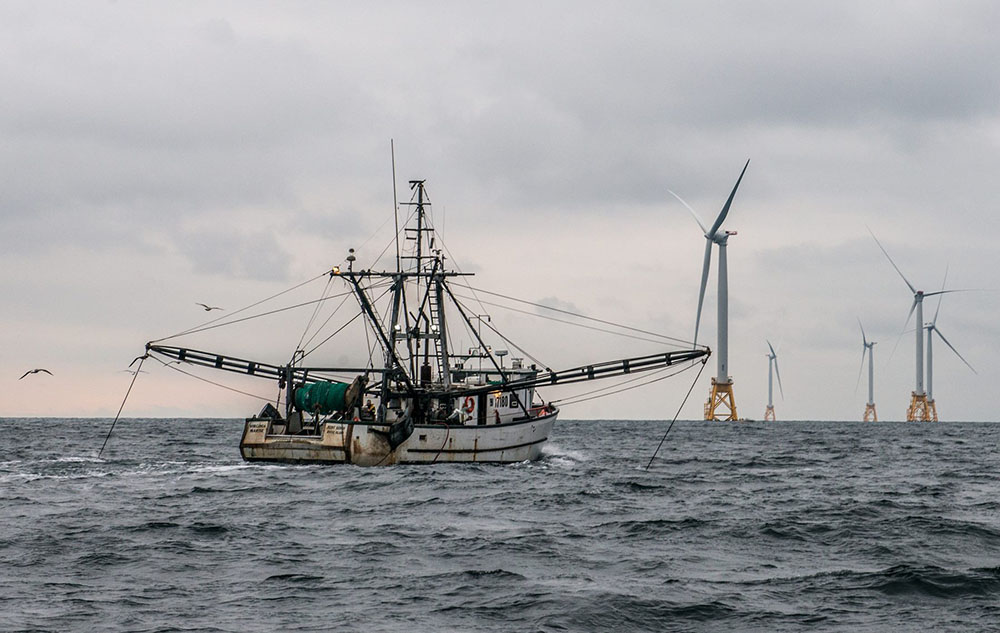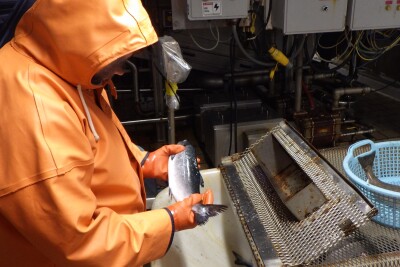The Bureau of Ocean Energy Management is working to expand and improve how it uses information from fishing communities in planning offshore wind energy development, BOEM Director Amanda Lefton says in a new letter to the Responsible Offshore Development Alliance.
The Aug. 10 letter came a few days after a public meeting with fishermen in New Bedford, Mass., the latest in the agency’s contentious relationship with the industry.
In the letter Lefton set a conciliatory tone with RODA, a coalition of fishing communities and advocates – while defending the agency’s efforts and promising to continue improvements.
“Since RODA’s founding, BOEM has been committed to collaborating with you and the fishing communities that your organization represents throughout the offshore wind leasing and development process, as well as through our environmental studies program,” wrote Lefton. “I look forward to continuing and enhancing that spirit of collaboration.”
The letter is a direct response to an April 6 document RODA submitted to the agency as part of public comment on the approval process for the 800-megawatt Vineyard Wind project off southern New England. Lefton cited that project as an example where the agency heard RODA’s recommendations, but ultimately came to a different conclusion.
“We recognize that your membership has serious concerns about the process and whether your input is being taken into account. We value the fishing communities’ input, give it serious consideration, and have incorporated it into many offshore wind decisions,” wrote Lefton.
“Most recently, in the Vineyard Wind 1 Environmental Impact Statement (EIS), BOEM analyzed a RODA-supported (vessel) transit lane alternative, but ultimately chose an east-west grid turbine layout proposed by a large segment of the commercial fishing industry in that area,” the letter states. “In addition, the Vineyard Wind 1 Record of Decision (ROD) established a gear loss and revenue compensation fund and adopted measures that will provide biological and environmental data to inform mitigation activities.”
Lefton also recalled that BOEM has acted on fishermen’s recommendations to remove some areas from energy leasing because of their status as valuable historic fishing grounds – specifically near Nantucket Lightship off Massachusetts, Cox’s Ledge south of Rhode Island and Massachusetts, and the Cholera Bank near the New York Harbor approaches.
In a statement Thursday RODA released a copy of Lefton’s letter, and reacted positively to it.
The group’s April letter “was signed by 1,665 fishing community members, spanning every U.S. coastal state and representing over 50,000 employees and association members, regarding the then-pending Record of Decision for the Vineyard Wind project,” according to the RODA statement. “On behalf of those community members, we thank Director Lefton for her reply and are encouraged by the acknowledgement of the concerns expressed and the responses to their requests.
“We look forward to more frequent, transparent, communication in the future. We are especially grateful for BOEM’s responsiveness and its stated interest in ‘continuing and enhancing that spirit of collaboration’ with fishing communities. We eagerly welcome a future of transparent, collaborative work with BOEM under the Memorandum of Understanding between our two organizations and the National Marine Fisheries Service.”
“We framed it as ‘things to be done yet,’”said Anne Hawkins, RODA’s executive director, about her group’s response to Lefton.
On one hand, said Hawkins, fishing advocates are appreciative of the BOEM outreach and other recent gestures, like Interior Secretary Deb Haaland and White House Council on Environmental Quality Chair Brenda Mallory visiting Humboldt County, Calif., this week and talking to fishermen about West Coast offshore wind planning.
But BOEM’s march toward laying out more offshore wind energy areas still needs to demonstrate more commitment to incorporating local concerns and adjusting, said Hawkins.
“It does feel very much like they are dictating the terms of engagement,” said Hawkins. The approach and tenor sounds like corporate promises of “social responsibility,” she added: “BOEM is acting like a corporation.”
In her five-page missive to the group, Lefton defended her agency’s actions and noted limitations on what fishermen can expect; BOEM for example does not have power to set a broad U.S. energy strategy, as some have called for.
“BOEM’s responses to the topics raised in the letter indicate the agency acknowledges the existence of fishing concerns raised previously, though it provides little evidence BOEM has afforded fair consideration to alternatives that would minimize and mitigate impacts to fisheries and better coordinate fisheries and offshore wind science in the past,” according to RODA.
“Recent events in which offshore wind projects in US and European waters have experienced operational failures, and the substantially higher oversight standards for large infrastructure projects in other industries, provide little assurance that these matters will simply work themselves out,” the groups says.
But RODA said it wants to move forward: “Despite disagreeing with much of the content of BOEM’s letter, there is no obvious need to relitigate numerous highly complex scientific and socioeconomic questions in this response.”
The group said it has come up with a “list of action items”:
- Remove barriers to participation in planning and permitting processes - Ensure navigational safety
- Support seafood business and community longevity
- Improve communications with fishermen
- Understand and minimize environmental impacts
- Develop solutions for responsible transmission
- Enhance research







